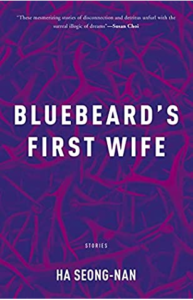Happy December, everyone! Let’s start the month with a chilling read!
 I have a bad habit of not remembering why I picked up certain volumes, not helped by the often considerable lag time between me deciding I want to read a book and me actually getting the opportunity to read it. So I vaguely recall placing a library hold on Bluebeard’s First Wife by Ha Seong-nan because I was told it was a collection of horror stories set in contemporary South Korea. And it’s not. It’s actually better.
I have a bad habit of not remembering why I picked up certain volumes, not helped by the often considerable lag time between me deciding I want to read a book and me actually getting the opportunity to read it. So I vaguely recall placing a library hold on Bluebeard’s First Wife by Ha Seong-nan because I was told it was a collection of horror stories set in contemporary South Korea. And it’s not. It’s actually better.
I mean, if your idea of horror is anything psychologically thrilling a/o supernaturally tinged, then sure, BFW is going to be the spooky read you’re looking for. Of the 11 stories included here, only two have an overtly supernatural component to them, and even fewer verge into territory so violent or grotesque that the horror genre may take over from mere crime. But each and every one of these tales is disquieting and sad, with survival being perhaps the happiest ending available to the heroes, who are also often the victims, of these stories. In some ways, this book reminded me of Patricia Highsmith’s Little Tales Of Misogyny: where Ms Highsmith wrote with a barely concealed contempt of her characters however, Ms Ha treats hers only with empathy, even when they’re being foolish or just plain wrong.
Perhaps my favorite story of the set, and one of the most traditionally “spooky” is the closer, Daisy Fleabane, about a young girl who remembers going fishing with her dad and picking wildflowers while he waited in the water. The story that hurt the most was On The Green, Green Grass, about parents who care more for their kidnapped dog than for their child; with its revolting imagery of, among other things, dog meat restaurants, it is not for the weak of stomach. Joy To The World is the kind of tale that’ll give any woman nightmares, depicting not only a horrific betrayal of trust but also the loneliness of its aftermath.
One interesting thing about this collection is that the works are so uniformly strong that I can only rank them by what resonated with me personally instead of by which were objectively better than others, a remarkable feat in this day of kitchen-sink compilations. Ms Ha’s tales, elegantly translated from the original Korean by Janet Hong, work so well because they are so different from one another, even as they revolve around similar touchstones: being from Seoul and wanting to go back, getting into and out of bad relationships, neglected children who are only missed once they’re gone. There’s also a quiet existential despair running through these tales of life in turn-of-the-21st-centry South Korea. The title story would be comical were the characters American or European, but with the more conservative mores of 2002 (when these stories were originally published) Asia, it is instead a springboard for a bleak future bereft of anything but existence. Similarly, the afore-mentioned Joy To The World could have been passed off as a comedy of errors or perhaps the basis for a feel-good empowerment story but is instead placed in a milieu where attachments matter and injured feelings rightfully carry long-term consequences.
It was weirdly interesting to see where I, as a Malaysian and an American, would relate to the emotional beats of each story, with their underlying cultural assumptions, and why. Unsurprisingly, one place is with the food, dog meat notwithstanding. The setting is Very Korean and I am super craving banchan, stews and spicy squid as I type this.
Overall however, BFW is the kind of book that makes the reader queasy, that focuses on the disorienting feeling of losing control, often to an outside entity that may not necessarily be malevolent, but is definitely looking out for itself first and foremost. I do not recommend pairing it with watching the first few episodes of the final season of The Man In The High Castle, as I made the mistake of doing: that is a combination of beautiful downers no one needs. But this is a good book for quiet chills, for reckoning with the despair that seethes just below the placid surface of everyday life, as beautifully evoked in the metaphor of waves in one of the middle stories of this collection, The Dress Shirt.
Bluebeard’s First Wife by Ha Seong-nan, translated by Janet Hong, was published June 16th, 2020 by Open Letter, and is available from all good booksellers including
Want it now? For the Kindle version, click here.
